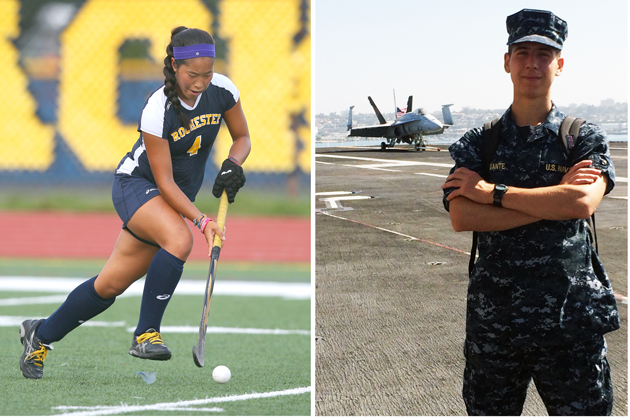Iota winners embrace academics, extra-curricular activities
January 19, 2015
 (Sayaka Abe, at left, is a member of the varsity field hockey team. Nicholas Morgante, shown aboard the carrier USS Ronald Reagan last summer, serves in the University's Naval Reserve Officer Training Corps. Both are recipients of the Iota Book Award.)
(Sayaka Abe, at left, is a member of the varsity field hockey team. Nicholas Morgante, shown aboard the carrier USS Ronald Reagan last summer, serves in the University's Naval Reserve Officer Training Corps. Both are recipients of the Iota Book Award.)
ChemE's latest recipients of the Iota Book Award – sophomores Sayaka Abe and Nicholas Morgante -- have something else in common as well:
Even as they embrace the academic rigors of their engineering major, they find time to excel in extra-curricular activities.
Abe, for example, is a varsity field hockey player who was selected to the NFHCA All-Region team for her stellar work as a midfield defender this season, when she appeared in 18 games and saw over 1,000 minutes of playing time.
Morgante is serving as the Training CPO (chief petty officer) in the University’s Naval Reserve Officer Training Corps this semester, part of a weekly, 20+ hours of morning workouts, coursework, leadership labs, drills and summer military training preparatory to becoming an officer in the Navy after graduation.
Each fall, the Iota Book Awards are presented by the Iota Chapter of Phi Beta Kappa and the College to sophomores who have demonstrated excellence at the very beginning of their college experience, through scholarly achievement, humanistic values, co-curricular activity, and leadership potential.
Abe, who is from Putnam Valley, N.Y., and Morgante, who is from Brewster, N.Y., shared these thoughts on their college experience so far:
Question: Why did you choose to attend the University of Rochester?
Abe: “I wanted that competitiveness and rigor that comes with the academics, but most importantly, I get to enjoy playing field hockey while receiving a great education.
Morgante: I chose UR because of its open curriculum. I can incorporate my interests like Spanish and History into a major in Chemical Engineering.
Question: Why Chemical Engineering?
Abe: I knew I wanted to go into the engineering field prior to coming to college but I didn't know which one to pick. I really enjoyed chemistry as well so I just went with it. I don't regret it at all. I've been exposed to bits of what it really is and, based on my friends' experiences, I know I definitely want to continue with it.
Morgante: Chemistry, Physics, and Calculus were my favorite high school classes. This major seemed to combine them all, and thus far I am enjoying it.
Question: What are some of your favorite classes and what have you learned so far?
Abe: My favorite class so far would be freshmen organic chemistry. It was awful at times because of the stress and just the difficulty of the content but, weirdly, I ended up really enjoying the class. I learned how to manage my time, and how to study and how not to study.
I've only had two chemical engineering classes so far, which were pretty introductory. It's about to get interesting this semester when I take fluids. From what I have taken though, I've learned about energy and alternate sources, which I've definitely taken a liking to. I'm currently planning on pursing an environmental engineering minor.
Morgante: My favorite classes thus far have been Organic Chemistry I and General Chemistry II. I found it fascinating to learn about many of the processes that are often take for granted, like the various chemical reactions that can be utilized to generate electricity for powering our cars and homes. I also learned techniques for working in a laboratory setting, such as how to maintain a proper lab notebook, to devise experiments with minimal guidance, and to safely and efficiently run chemical reactions. However, I feel that the rigor of these courses provided the greatest reward. It was not possible to excel by merely memorizing and applying formulas. My professors required students to truly understand the concepts behind problems.
In General Chemistry II and Green Engineering I developed a basic understanding of the science and engineering behind the operation of nuclear reactors. This information is both stimulating to my interests and relevant to my goal of attending Navy Nuclear Power School after graduation.
Question: Any tips on how to find time for other activities, given the rigors of the engineering curriculum?
Abe: Plan ahead. Some weeks will be tougher than others, but making the easier weeks count helps a lot.
Morgante: It is vital to establish a specific and challenging yet realistic goal for yourself, such as earning Dean’s List, and to remain steadfast until that objective is met. Often on the path to that goal, coursework, exams, and extracurricular involvement compile into a seemingly insurmountable list of obligations. In order to combat this, I have found it effective to organize my tasks, rank them on priority, and complete them as necessary. Moreover, during critical times in the semester, like the weeks preceding midterm and final exams, work must take precedence over fun – meaning that Friday and Saturday nights will primarily be spent preparing for exams or solving problem sets. During these challenging times, it has been equally important not to lose sight of the established goals and the reality of the situation. Remember that everything must end, and if you can reflect back on the semester knowing that you genuinely gave it your best effort, you will never be disappointed!
Question: Where do you see yourself 10 years from now?
Abe: I hope to be doing some sort of work involved with alternative energy.
Morgante: I plan to have a stable career in either the US Navy’s submarine community or in the chemical engineering industry.
